Two days ago I found myself in Sanjiang late in the evening. The next bus to Guilin, a major city, left at 6am the next morning, and every cheap guesthouse was full. I spent the night in an internet cafe, catching up on news, writing, and watching Zhen Zidan movies. As the sun came up, I grabbed a couple of steamed buns and the earliest bus out.
To understand why transportation is so difficult for me at the moment, you have to understand one of the craziest traditions that the Chinese have every created. Every spring festival (also known as Chinese new year), at the beginning of February, everyone has to go home. No matter whether you live next door or five provinces away, no matter whether you are rich are poor, no matter how long you have been away, the call home for spring festival is one of the most emotionally charged imperatives in the Chinese soul. Combine this with a country populated by 1.4 billion people, 200 million of whom live and work on a migratory basis, and the result is a holiday traffic boom of proportions seen nowhere else on earth.
I got into Guilin in the morning and went straight to the train station, where I waited in line with a mass of students and migrant workers. When my moment finally came, I quickly found out that the next sleeper bunk available back to Nanjing was not for ten days, and the next seat was not for a week. There was no way that I could get back to Nanjing in time for classes without resorting to a means of travel I had never used before: the standing ticket.
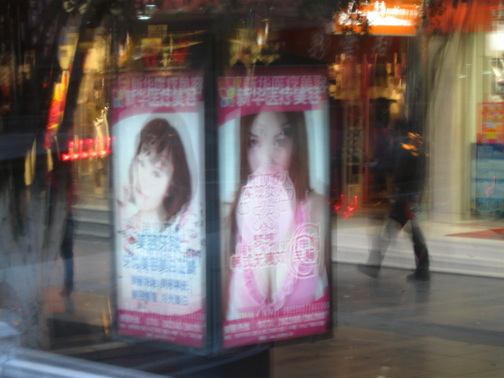 An advertisement in Guilin, reflected through a bus window, celebrates the latest wave in Chinese women's fashion: breast enlargement. 'Fulfill every woman's dream,' it promises. Chinese railways, sensibly enough, see it as a waste to fill up a train only to have the seats go empty as passengers get off at their respective stops. To increase efficiency, they allow passengers to buy tickets without an assigned seat. On many trains, a standing ticket only means standing for the beginning or end of the journey, depending on whether you are moving towards or away from a more populated area.
At spring festival, however, standing tickets become the means to cram as many human beings as possible into a train car. And so it was that I got on the K1192 to Nanjing, a 26 hour ride, with a ticket but no seat.
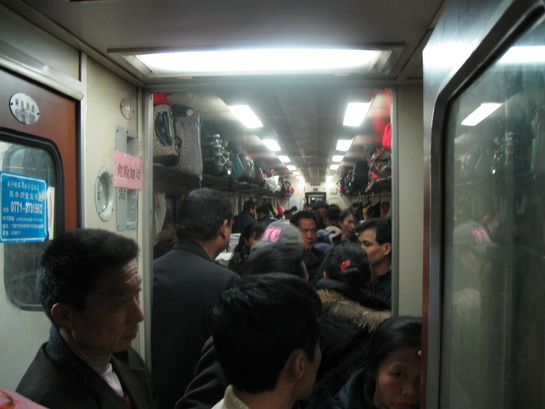
The picture to the left, to be clear, is not of people boarding the train. Those with seats have already sat down, leaving those visibly in the picture where they are. A rough count (imprecise because movement was more or less impossible), put this car at at about 220 people to 140 seats, not to mention baggage. The conductor spent ten minutes cramming more people on before the train could leave. He briefly decided that no more would fit, then realized that he could not really turn away somebody who had been sold a ticket, and the cramming continued. After the train was underway, he fled into his office on the left.
By evening, a sort of natural entropy had settled people into corners and many had enough space to lean against or squat on their baggage for comfort. The conductor came out and, seeing the single foreigner, invited me into his office. I felt intensely awkward being given a place to sit in front of the dozens of seatless people around me, but the other option was to refuse - giving my fellow standers even less room. My conscience was soothed a little by the tiny, closet-like office, which was not really much more comfortable than the outside. I sat on my backpack in a corner while the conductor complained bitterly about the poor manners of the people on the other side of the door. Finally he fell asleep, and I dozed off for a couple of hours myself, propelled by the previous 36 hours of sleeplessness.
As the sun came up, the conductor was replaced by a younger man. The switching time gave an opportunity for two older men to slip into the conductors cabin, evening out the density. The new conductor accepted the situation with a shrug, and promptly fell asleep. At the next stop, the two old men managed to open the window and bought chicken wings from a vendor on the platform. For the next two hours, they happily ate chicken and chatted in an incomprehensible Hunan dialect.
Around noon, the peaceful equilibrium was disturbed by the return of the first conductor, who decided he was going to eject us from his office. This proved impossible, because the jam of people outside the door was simply too thick to receive three more. For an hour we held an unhappy truce through which we stood awkwardly by the door as if trying to leave, and the conductor gave up yelling at us.
Finally he left, and we settled back into the office, joined by a little girl. The little girl and I bonded over our mutual incomprehension of the two Hunanese gentlemen, and spent an hour discussing what we wanted to do when we grew up, and what kind of vegetables were being planted outside the window. The little girl was joined by her little brother, and then her mother, and the office began to get a bit crowded.
In late afternoon, I made my escape and found a place to wedge myself into the isle with my legs underneath some seats. I spent the late afternoon this way, reading The Economist. At dinnertime a steady trickle of people started stepping over me towards the hot water machine to soak their instant noodles, so I escaped once again to a recess between two suitcases where I rode out the evening.
More than a day later, I emerged on the Nanjing platform, cramped, deliriously tired, but alive and home. I am left with both deep respect and a little disbelief towards the millions of migrant workers who make this journey twice a year. If there is any question what importance home has to the Chinese, this is the proof.
Regards,
Niko
Today I decided I needed to start heading back to Nanjing. I have been travelling for a month and a half, and the wear and tear of the road, along with two bouts of food poisoning and some cold weather, are hitting home. I have about a week until classes start, and travel will not be easy at this time of year.
I said goodbye to my travel companions, and headed off to the train station. Unfortunately, in this little stop along the line you cannot book train tickets. All you can do is wait for a train to come and hope there is a seat for you. There was no seat for me today, so I will probably catch an early bus to a city tomorrow morning and see what I can do from there. On the up side, while waiting for the train I spent the day exploring this little village on the hillside below the train tracks. This is real small-town China. This is where 60 per cent of the Chinese population lives, far away from the lights of Shanghai and Beijing. If Joe Biden was Chinese, this is where he would say he was from.
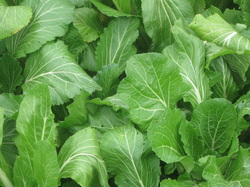 Cabbage There are no restaurants, no hotels, not much to see, and not much to do. Nevertheless, I think these places are beautiful. The tumbling, ill-matched brick houses have a surreal, Tim-Burtonesque appeal. The patchy fields around the outskirts embody the unspoken law of the Chinese countryside: If you aren't doing anything else with this place, plant cabbages.
Down one side street I stumbled across this simple ancestral temple, piled with offerings of apples and incense. Outside, the names of benefactors are inscribed on a stone block. One patron, it seems, has been donating three yuan to the temple's upkeep every year for as long as the inscriptions have been written.
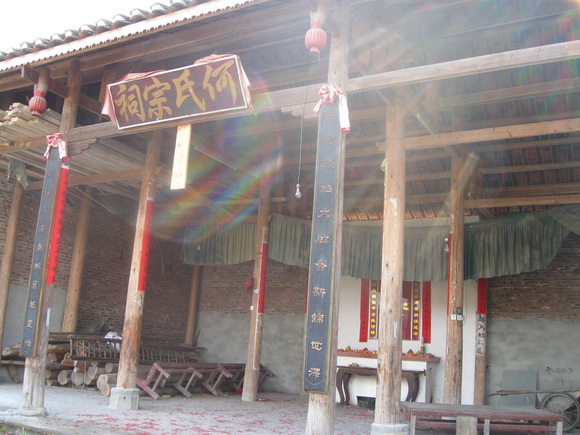 If anyone can help me identify the right-hand character, I would be obliged. 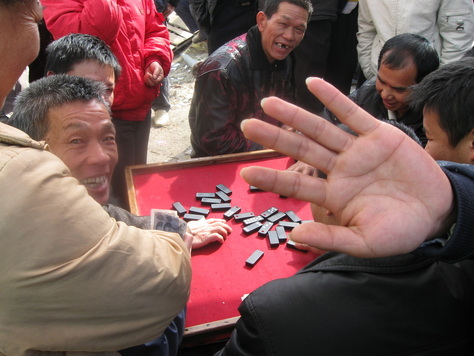 On what probably stood for main street, this crowd of gentlemen had a great time gawking at me, but were less enthusiastic about having their picture taken (as you can see here). That's likely because they are gambling, an activity more or less illegal in China.
I have never seen this particular game before, but it seems they are playing some kind of game with dominoes. Unless the readers of my blog are in law enforcement and have Sherlock Holmes like powers of deduction, I would imagine they are safe for now.
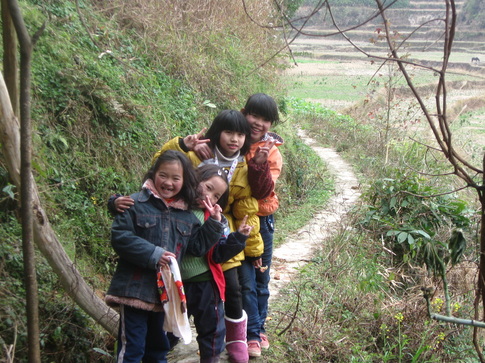 The hills above the village are planted with tea. The very beginnings of the new leaves that will be picked in this year's harvest are just beginning to poke out their light green heads.
In the hills, I ran into these four girls. Three were two embarrassed to talk to me, but the twelve year old in the yellow jacket is proud of her standard Chinese, learned in boarding school in the city. She showed me around the mountain, and rattled on about her parents, her school, and an old man she saw on TV who exercised so much that his hair turned back from grey to black.
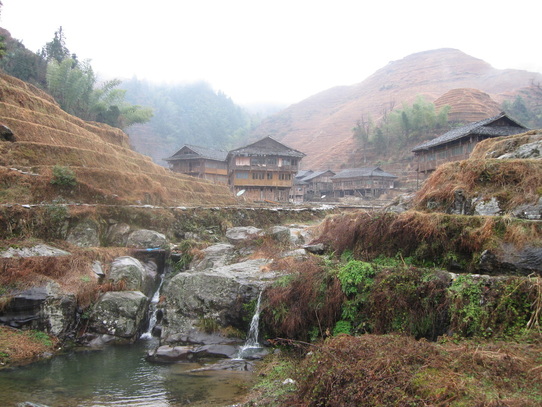 Wooden Yao minority houses near Dazhai I have spent the last few days with my old friend Xuejingrong and her boyfriend hopping from village to village through the north of Guangxi province. Guangxi is home to the largest population of Chinese minority people in China (although not the largest number of different minorities, a title held by Yunnan.) Most of these are Zhuang minority, with the addition of some Miao, Dong, Yao, and others.
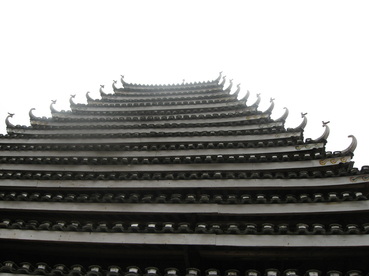 A mortise and tenon drum tower of the Dong minority, built without a single nail The common outside conception of the Chinese as a single ethnicity is far from the truth. There are 56 recognized ethnicities in China. The largest, the Han, make up about 90 per cent of the population. The remaining 55 minorities make up a remaining approximately 10 per cent (for perspective, visible minorities made up 16 per cent of the Canadian population in 2006.) Some Chinese minorities, such as the Zhuang, are so similar to the Han as to be nearly indistinguishable. Some, like the predominantly Muslim Hui minority, have clearly different features, language, clothing and customs. The phrase "zhonghua minzu," or Chinese ethnicity, is a catch all term for the Chinese people. Whether or not a single such term is meaningful, however, depends on who you talk to.
Here in Guanxi, however, ethnicity has a different meaning altogether. It means business. The tourist trade here is propelled by Han Chinese and western tourists who come to see the ethnic mosaic on display. And the display is indeed beautiful. Within a hundred kilometre radius you can see the breathtaking rice terraces of Dragon's Backbone, carved wooden "wind and rain" bridges crisscrossing picturesque valleys, and the colourful costumes and headdresses of minority women selling vegetables in village markets.
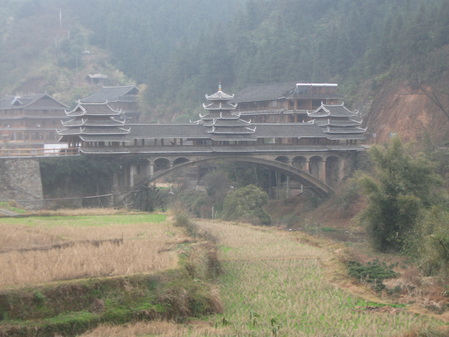 A wind and rain bridge at Chengyang
The trouble is that indefinable, elusive substance known as "authenticity." The tourist trade here is driven by people who want to see the "real thing," minority people living in their natural environment, following their traditional customs and celebrating their own culture. The people who live here, meanwhile, are realizing that their own ethnicity is a goldmine waiting to be excavated. Towns around Dragon's Backbone are slowly turning into clusters of guesthouses as family after family realizes that taking in tourists makes more money than planting rice. After seeing the vast rice fields I asked one old woman where all the people are to plant so much ground. She told me that the men all work in the city, only coming home around planting and harvesting time. The women stay at home to tend to the real crop: people like me who want to wander around the terraces and stay in the beautiful wooden stilted Yao houses.
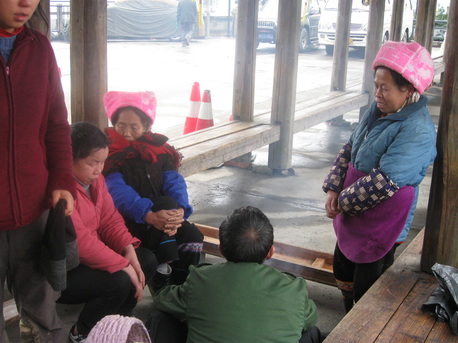 Yao women keep warm around a fire while waiting to porter tourist's luggage up to the village
Unfortunately, tourists don't like this kind of development of the tourist trade. You can predictably see a tourist's face fall when, in one of the guesthouses, the host quotes a price for dinner that is twice the average price in the city. Tourists are not sorry to pay so much money - rates are still quite reasonable - the disapointement is rather that this particular place has been "corrupted" by the tourist trade.
This cycle leads to a game of tourism whack-a-mole, in which tourists look for new untouched places, only to leave a new enthusiasm for the tourist trade in their wake. There is an interesting economic puzzle here. How can locals benefit from the tourist trade without upsetting the lifestyle that draws in the tourists in the first place? This place walks a thin line between poverty and opportunity, tradition and exploitation. Like so much of China, it is hard to say what the next ten years might bring here.
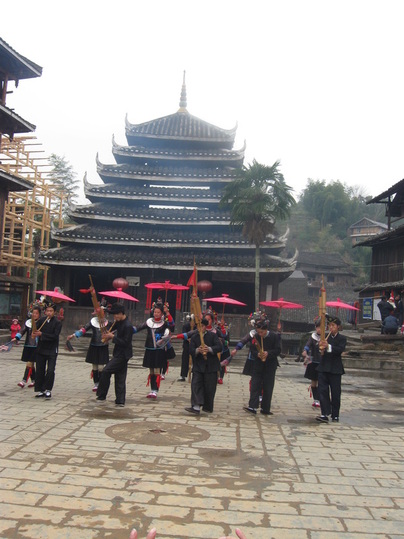 The Dong of this village put on a music and dance display for visitors twice a day. 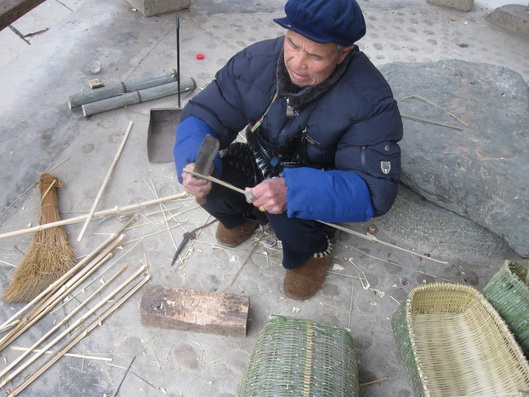 Unconcerned with tourists, a bamboo worker weaves baskets for sifting rice.
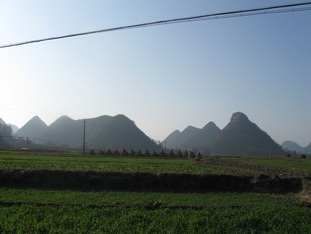 On the eve of Spring Festival, the Xiong family gathers in older brother’s house. Older brother, his wife, and his aunt-in-law have been at work in the kitchen all day. The house has two rooms downstairs, a small guestroom and a kitchen. In between is a little courtyard, bordered by a cracked concrete wall obscured by flower pots and ivy. The kitchen is a dim cave of sizzling and steam. In the guestroom, grandpa is shuffling about slowly, arranging furniture.
Little sister arrives, little brother, first auntie, and finally little brother’s wife and four or five distant relations. Everyone crowds into the guestroom to huddle around the fire and chat. Without much delay, the food comes out. It’s clear that the food is what this evening is about.
The Xiong’s joke that they have spent all week preparing for this one meal, and it hardly seems like an exaggeration. There are more than twenty different dishes on the table. There is at least one dish of every kind of meat on the table – pork, beef, fish and mutton. There were many years in the past when there was no meat on the table, so now they eat every one to symbolize the better times. Fish is especially important because the work for fish, yu, is a homonym for “abundance.” There is also a big pot of changcai, a long thin green vegetable that symbolizes long life. Altogether, the food covers two whole tables.
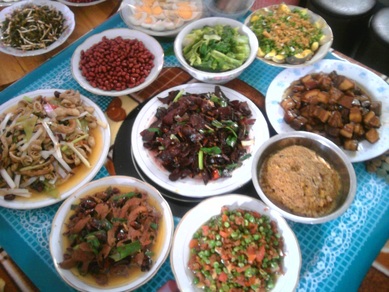 The Xiong family is not religious in any formal sense, and saying grace is not a Chinese custom anyway, but there is a minute of almost sacred reverence as the whole family sits around the table and observes the food. This is the meal of the year, in a country where eating together is the cultural fulcrum. At last, grandpa lifts his chopsticks and casually scoops up a piece of pork sausage.
“Eat!” he commands.
The meal lasts for over two hours. The real effort fades after the first hour, but the family continues to sit around the table and talk. The men drink fiery white Chinese liquor, and the women gossip. Once in a while a pair of chopsticks is raised and the struggle briefly continues.
At 8pm, the television turns on. It is time for the spring festival evening show. This is the most anticipated, watched and quoted program of the year – a spectacular, star-studded six hour gala of song, dance, and comedy. The whole family watches until midnight, when everyone walks out towards the city centre for the show.
The Chinese invented fireworks, and I do not believe there is anywhere that their essence is more apparent than in a Chinese city at midnight on spring festival. First there is the thunderous roar of the small red firecrackers, hung in bright strips from doorways and lampposts. Then the snaps and flashes of rockets join in, then the roman candles and flares from rooftops and balconies. Finally, at the stroke of midnight, the big box rockets in the street boom out, filling the sky with pink and orange and green stars.
There is no display, no centre, no one place to look. The entire city is setting off fireworks. One can imagine that there is hardly a place in China so remote that the roar of fireworks does not disturb it. Here you can feel what fireworks are about: shaking the earth, rattling the eaves, knocking the dust out of every corner, blasting out the old, blazing in the new.
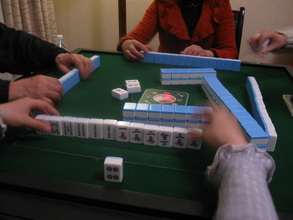 The first day of the new year the majiang set comes out. The family sits around two tables, and the room is filled with the clink of tiles and cheerful gambling banter. The stakes are low; over the course of the morning only about 50 yuan changes hands altogether. The game is more about the talk, cheerfully taunting relatives as you empty their pockets.
The third day, the family sets out for the hills. The highest peak surrounding town is ringed with gravestones, set in curved alcoves in the rock. Little brother carries a basket with incense and offerings. High above the town, in a grove of fragrant cypress trees waving in a spring breeze, the family gathers around the grave of grandmother Xiong. Each approaches the grave, and offers a prayer. Some pray for protection, for health, or for guidance. Many offer prayers for auntie, who still has not found a husband. Each Xiong kneels before the grave and performs three ketou, touching the head to the ground. Finally, a ring of firecrackers is strung around the grave.
At noon, the roar of firecrackers echoes from a hundred graves across the mountains, calling the ancestors back to the village to once again eat the noon meal.
If Chinese hospitality is not famous, it ought to be.
A Chinese host cares for a guest with a psychotic hospitality that can overwhelm and bewilder the unsuspecting westerner. After nearly two years in China, I still get caught off guard.
A couple of nights ago I met Fu Zhilan at the movie theatre. I had nothing to do for the evening, so I went to see Tron. Like eating oreos, going to the movies is something I do in China to remind me of Canada even though I never actually do it at home.
Fu is a fourth year law student in Guiyang; she comes from a smaller town a few hours away. We went out to eat after the movie, and she beat me to the bill with the infuriating skill that all Chinese people seem to possess. Oh well, I thought, I'll get it next time.
But it was not to be. Every time we have bought so much as a bottle of water together she has pushed me aside, declaring firmly "You mustn't do that; you are a guest!" All of my usual tricks are no use.
To a Canadian, all of this can get embarrassing and awkward. I am not used to watching someone I have hardly met slap down money for me over and over again. Like so many other things in China, however, it is something I may just have to swallow. I have noticed that the more remote and traditional a region of China, the more this attitude prevails. My friends in relatively modernized Nanjing will split a bill, but in Guiyang no such thing exists.
The Chinese have a commonly used phrase meaning "to pull tight connections." This is everything that the Chinese do to strengthen their social bonds: asking people out to eat, giving gifts, drinking together, sharing cigarettes, and so on. All of these things slowly build up social capital, a substance that is at least as valuable here as money or property. That is not to say that Fu's kindness has ulterior motives. This kind of behavior is rather a kind of instinct that the Chinese possess, a faith that the money and effort spent making friends will all come back in the end. And one way or the other, it usually does.
This is one of the most fascinating, beautiful, frustrating and mind-bending elements of the Chinese world.
As usual, however, I really actually want to talk about food. Fu took me to eat at a friend's house this evening. Her friend is in his late 20s and from Guangdong province. He, his wife, two other friends, Fu and I were gathering for a meal before everyone left Guiyang to spend the new year in their respective hometowns. He made hot pot.
If you don't know what hot pot is, you should. It is one of the great foods of the world. Hot pot is made by stewing a soup base with oil, vast amounts of chili peppers, spices and herbs in a large pot with a steady flame under it. Everyone sits around the pot, and dumps in any kind of food imaginable. As soon as the ingredients are cooked, everyone fishes them out with chopsticks and eats them. Simple, but brilliant.
Tonight's hot pot was served with a curious drink: mulled beer. Our host took a large pot of beer and boiled it, covered, with lemon, ginger, rock sugar, Chinese dates, and some medicinal herbs. The result was completely flat, but retained a surprising amount of its alcohol content, and had a quite complimentary flavour.
Guangdong people are known for their extreme tastes in food, even by Chinese standards. Some of the ingredients of this hot pot are as follows:
Sliced lotus root
Freshly killed and gutted trout (our host had to hold them down in the pot with chopsticks to stop them from flopping about).
Sliced pork kidneys
Shaved mutton
Bullfrogs
Mushrooms
Wood fungus
Spam
Sliced potatoes
Tofu skin
Chinese broccoli
Pork brains
Glutinous rice cubes
I know what you're thinking. Spam? Weird.
Regards,
Niko
So here I am.
The streets are still a mess today. Nobody is driving anywhere without chains. The weather report changes all the time, but even if I could get passed Yuping, there would be more snow, hail, freezing rain and sleet ahead. All of southern China is blanketed under a shifting mess of winter storm. 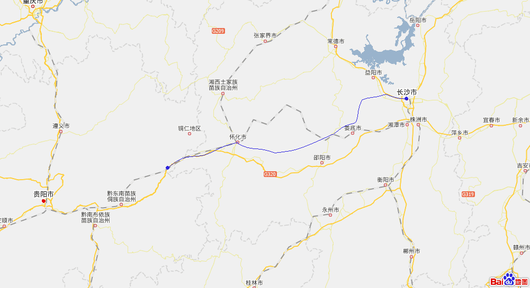 The blue line represents my route, the red dot my destination.
On top of it all, I've got a bit of "spicy stomach," the Chinese term for what is not quite food poisoning but just ones body rejecting something that aught not to have gained admittance.
So after all, my trip will end here. The last few days have been a bit of a roller coaster. Three days ago I was worried I wouldn't be able to continue because of fatigue.
Two days ago I was feeling better and planning my last week to Guiyang. Now here I am again, stuck behind an impassable 300 kilometres of slush and ice. Today I will head over to the railway station and buy a ticket to Guiyang. It feels like an enormous defeat. I suppose I always knew this could happen, but the first week was so promising that I became optimistic.
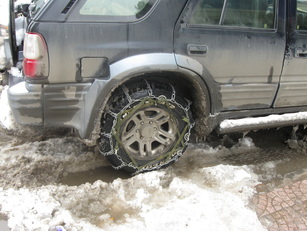
Though unsuccessful, the past week has not been a waste. I have biked 550 kilometres of countryside, and seen a face of China I could perhaps never have seen another way. I have met a lot of amazing people, and learned a little about how they speak and think and live their lives. For the past four years I have only really spent time in half of China, and I am glad I have finally seen the other half.
Sometime in the not too distant future I hope to do this again. Next time I will be better prepared. Maybe I will find ways to pack lighter. Maybe I'll pick a different season, find a multi-speed bike, give myself a couple of months, or find a travelling companion or two. There is much more out there to see, I have no doubt.
Thank you to everyone who has read this blog, everyone who has emailed in support, and every Chinese farmer who has invited me to warm my feet by the fire over the last week.
But don't stop reading yet.
This blog will continue to be an outlet for all my stories, photos, observations and articles about my time in China, even when I'm off the bike. So check back once and a while and see what I've been up to.
Regards,
Niko
So I woke up this morning, looked out my window, and saw this. There was a bit more snow, but I couldn't see the road so I had to haul on some clothes, put on my slippers, and pad down to the door to look outside. After all, there was snow on the rooftops yesterday. Maybe the street would look a little more friendly.
Nope. It was snowing like crazy. I went back to my room, organized my bag, went out and got breakfast and some hot soymilk, and took a walk. It was still snowing, and getting harder.
I'm not going anywhere today.
Instead, I spent the morning on one of my favorite activities: wandering around a street market. I have never been to Guizhou before, so there were all sorts of things I have never seen. They sell big vats of premade stew and pickled peppers, bright crimson blocks of pigs blood, and all sorts of other things I had never seen.
I was fascinated by piles of golden yellow lumps that looked like old-fashioned cheeses. I bought some sliced just to see what it was. The woman offered to sell me four yuan worth, which seemed reasonable. She gave me a bag that must have been about a kilogram. It turned out to be some kind of hard, aged tofu.
I had nothing to do with a kilogram of aged tofu, so I stopped an ancient looking peasant woman with a wicker basket on her back who was out buying vegetables.
"Grandma," I said, "I bought this tofu but I can't use it. Would you like it?"
"What are you talking about?" she said.
"Can I give this to you?" I said, gestering to the tofu.
She stared at me blankly.
"Here, I'll put it in your basket, is that ok?" I said.
"How much money do you want?" she asked suspiciously.
"None! I don't want anything!" I said, and fled, leaving her confused and a kilogram of tofu the richer.
Here are some pictures from the market.
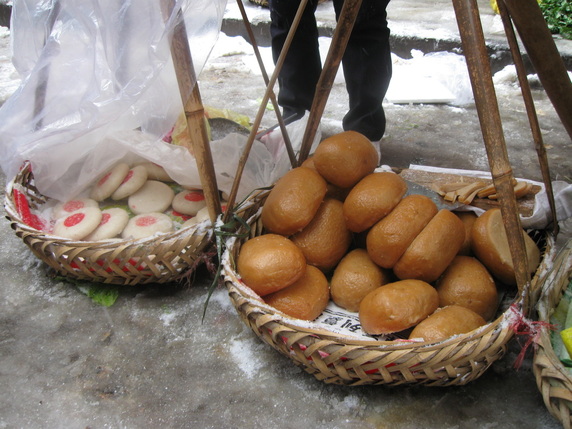 Glutinous rice cakes and aged tofu blocks (left to right) 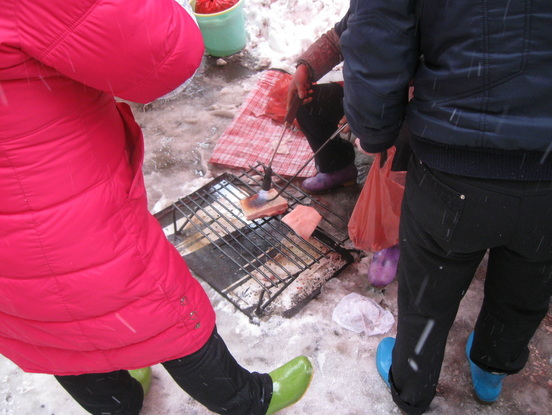 Searing pork with a blowtorch 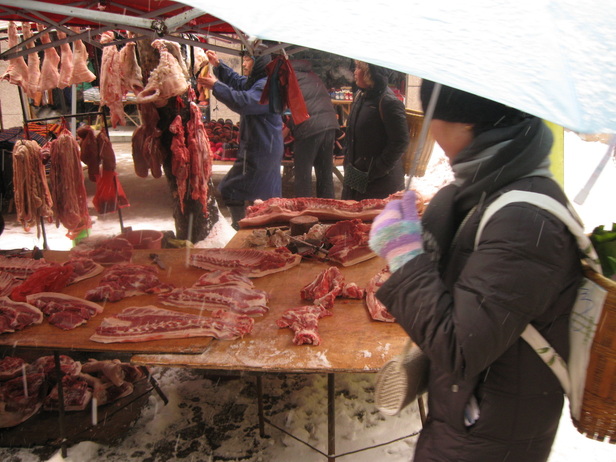 Many pieces of a pig 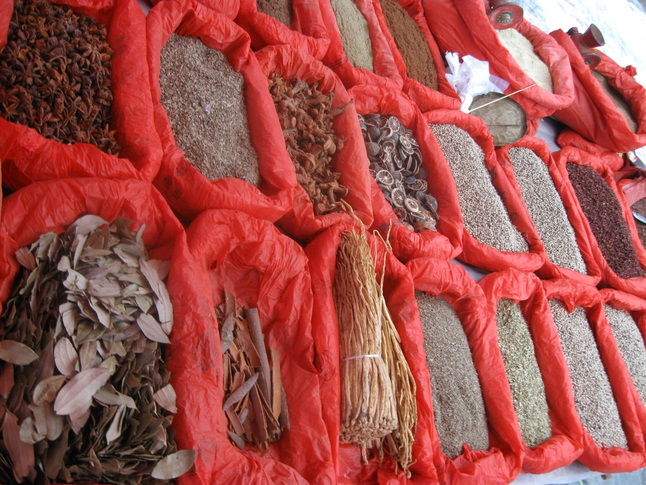 Spices
Regards,
Niko
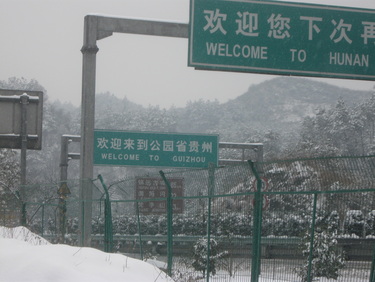 Either someone had translation problems, or Hunan is only ten metres wide I am writing from Yuping, an official Dong minority administrative region, in Guizhou province. Despite bearing the name "rich province" (named after a range of mountains, not for its literal meaning), Guizhou is one of the poorest provinces in China. It is home to the Miao minority, as well as some Dong and a few others. It snowed all night. When I got on the road this morning, much to the protest of my host, there were three inches of slush and snow everywhere. There are no ploughs here, and no salt. It took me three and a half hours to struggle the 30 kilometres to Xinhuang, what should have been an hour and a half ride.
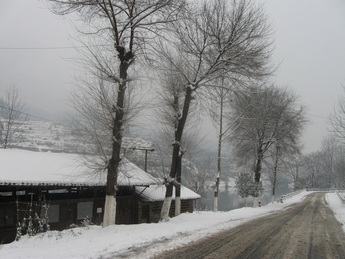 I was resigned to being stuck in Xinhuang, but by the time I had finished lunch, the weather had warmed slightly and the road cleared enough to bike properly. I got back on the road, and biked past the Guizhou border to Yuping. The afternoon was damp and cold, but at least bikeable.
The first thing I noticed about Guizhou was the food, which changed the instant I crossed the border. The favorite of street sellers seems to be parsley dipped in batter and deep fried.
There is little difference between a minority region and anywhere else. Minorities are allowed extra children, so I saw frequent PSA signs encouraging the voluntary one-child lifestyle.
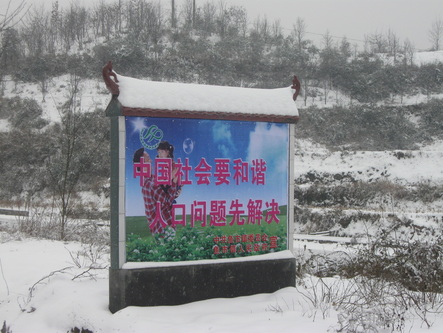 'If China's society is to be harmonious,first we must resolve the population problem.' 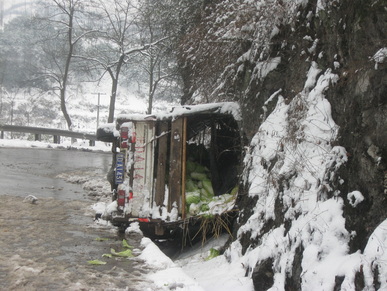 A cabbage truck overturned in the ditch I slept almost 11 hours last night. I always thought electric blankets were kind of silly, but in a land without much heating I have learned to respect them deeply.
My body felt a good deal better today, but I still have some major problems facing me. I cannot keep biking in weather like this morning. In addition to being painfully slow, it is also dangerous. I fell off my bike twice this morning, and although I was fine, I know from experience how easy it is to break an arm or a foot. This is not the time or place to take that risk.
The weather report calls for snow, snow, and more snow. If the roads are bad tomorrow morning, I will wait and see if it melts by late morning. If it does not, then I am stuck here for now.
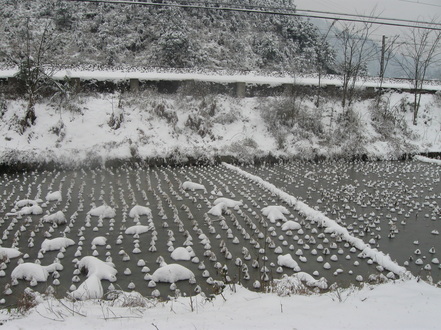
Regards,
Niko
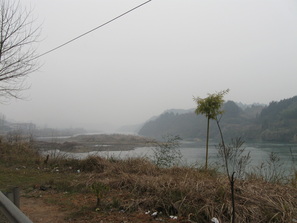 I am writing from an internet cafe in Xindianping. This place feels a little like what an internet cafe would be like in the old west. The whole building is rough wood, with wooden dividers between the computers, and a dim yellow light. My body complained at me a lot today. It can't do this too much more, it said, not at this pace, not for this long, not if it gets much harder. My legs and body I can handle; with enough rest they will revive. My knees, though, I am worried about. My knees were complaining a lot, and they are things that can just give up on a person.
Well, here is where I stand. I have seven days left before I meet my parents in Guiyang, and 390 kilometres of road in front of me. On the upside, that means that I don't have to keep this pace up, I can slow down a little and let myself recover. That being said, there is going to be some tough biking ahead. I want to ride all the way into Guiyang, but I am becoming aware that my body's ability to endure this life, not just its ability to cross certain obstacles, is becoming an issue.
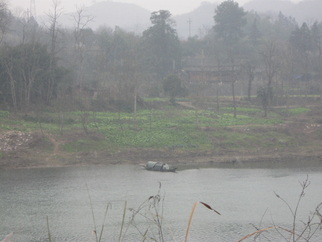 Snow over the Wu River I left this morning in a light sprinkling of snow, west along the Wu River. The highway was mostly even, with a few small rises and falls and one small mountain around noon. Despite the size of the road, the country was fairly empty. I passed a few small villages, but mostly just scattered houses, snow dusted cabbage beds, and quiet silver river along my left side.
I am in Dong country now. The Dong are sharp featured, long nosed people. When I catch one out of the corner of my eye, I often think I am seeing a westerner until I turn to look. They speak in a heavy accent, but with a slow drawl that actually aids comprehension.
At 4pm, the light snow built up into a howling snowstorm. Despite hopes of reaching Xinhuang, I was forced to stop over in a small village 30 kilometres short. The Dong woman running my guesthouse is 63, she told me proudly. She says at this age, she can't handle the cold anymore. Here they have a slightly different mechanism for keeping the family warm. A large wooden box the size of a hot tub sits on the floor, with a rim along the inside for sitting. On the bottom are wooden slats, covering clay bricks that have been heated over the gas stove. The family sits in the box, covering their laps with a quilt to keep the heat in.
My host asks me if my family sits around the fire in Canada. Yes, I answer, but not quite like this. I try to explain, but I'm not sure how much she understands.
Regards,
Niko
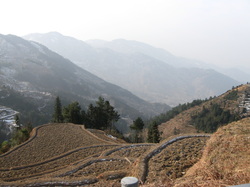 Down from the mountains First of all, I feel a good deal proud of being here tonight. There have been not a few times over the past two days when I have doubted whether I could get to Huaihua by tonight, and a couple of people I have met along the way have doubted it to. I put in at least 8 solid hours of biking today, and rode over 100 kilometres of mountains to be here. And here I am. I woke up this morning to the sound of roosters crowing, closely followed by the sound of a pig dying. By the time I was on the road, the pig was being chopped into pieces for sale. I admire these people's efficiency. The road from Xiaoshajiang went up and down over a few more hills through the early morning, and then dropped as dizzyingly as it had climbed. By the time the sun was visible above the mountains, I had shot down into the green valley below and left the snow covered peaks behind.
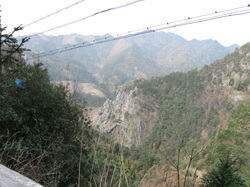 A bluff near Iron Slope Village
From there on, nothing was easy. I had hoped that the mountains would slope gently down towards Huaihua, or at least drop down into flat and open valleys. I had no such luck. Each little village was in a valley, and from one to the next required climbing up a mountain, winding across a jagged ridge, and then spiralling back down again. By mid morning, I was beginning to doubt I would get to Huaihua.
The obstacle is sunlight. I have all the time in the world, and my legs can carry me a long way given enough rest. The key factor is the meagre ten hours of winter sunlight between about 8am and 6pm. If I wanted to get to Huaihua, I had to do it before the road went dark and I could no longer tell a bend in the road from a rocky precipice.
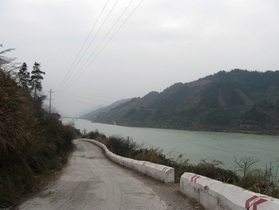 The Yuan River In the afternoon, I crossed the broad emerald green Yuan river, and headed back into the mountains beyond. Here, everything got worse. My bike handlebars came loose, I would guess from the back and forth strain of biking uphill yesterday. I had to awkwardly wedge them stable while I biked up the next hill and down into the following valley where I got the bolt tightened at an auto repair shop.
An hour later, the whole thing happened again. This time, when I finally wobbled into a repair shop, I realized what should have been obvious before and bought the tightening tool (3 yuan). Naturally, once I had the tool, my handlebars never bothered me again.
At 4pm I passed my last possible stop before Huaihua, and decided to go for it. The last two hours were an exausting climb up another ridge of mountains, but by dark I was swooping back down towards the lights of the city.
This morning I had noodles for breakfast. This afternoon I had noodles for lunch. And what did I have for dinner?
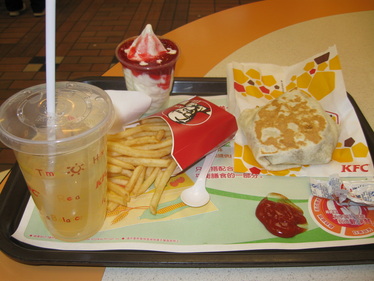 BAM! Indeed. Now, I am no big fan of KFC, but this is the first reasonably large city I have seen in a while and the last I am likely to see for a while longer. Also, KFC is better in China. It serves things like Beijing duck wraps, and spicy shrimp burgers. Ironically, it probably also treats its chickens better.
According to an online calorie estimator, I also likely expended over 4,500 calories today, so I can probably handle a little corn syrup right now.
Regards,
Niko
|


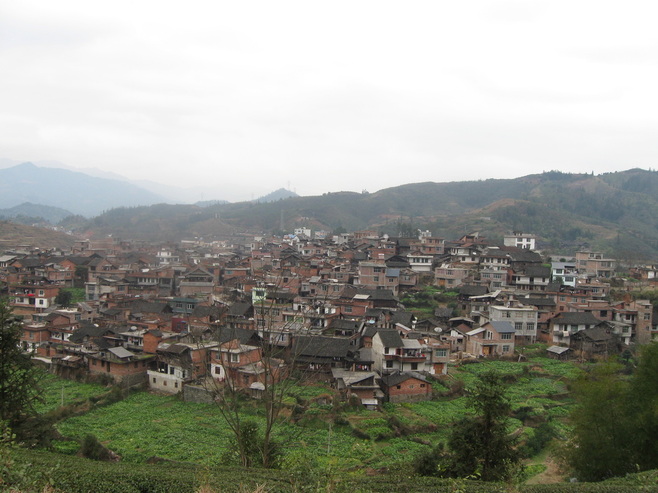



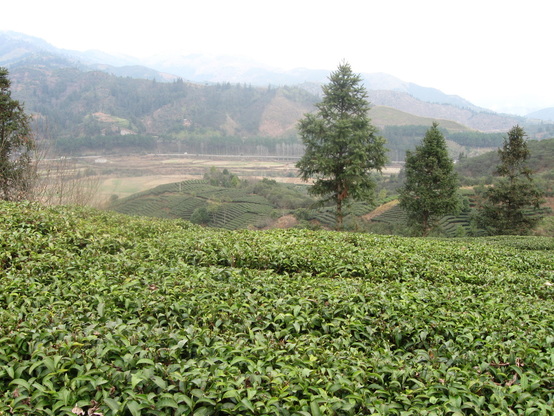












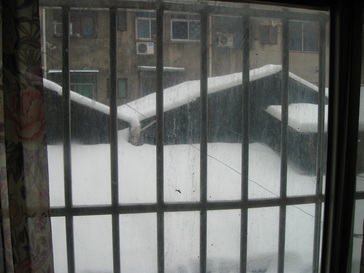
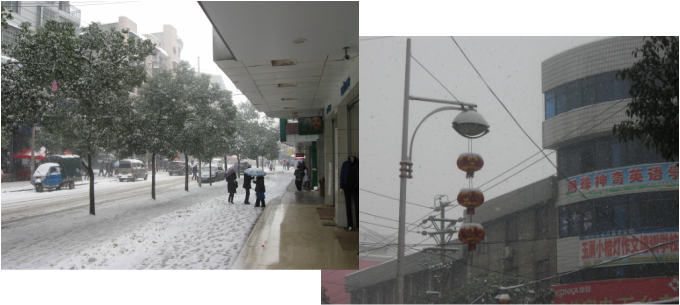















 RSS Feed
RSS Feed